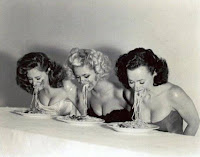 |
| Unconcerned about existing power positions |
This flaunting of moral superiority, upwardly mobile background can lead to
Self-enhancement in moral hypocrisy: Moral superiority and moral identity are about better appearances
In everyday life, we may witness a fair amount of moral behaviors. People often do not take the last piece of pizza, they seldom cut in line when waiting, and help an elderly person cross the street. Do people engage in moral actions because they are genuinely concerned about the well-being of others, or merely because they want to appear moral to others?.. These questions are related to the phenomenon of moral hypocrisy, which is to "appear moral, yet, if possible, avoid the cost of actually being moral”. Put differently, people may often present themselves as moral in public while privately reaping the benefits of selfishness. Although moral hypocrisy is prevalent in social life and ingrained in human behavior, little has been done to illuminate the motivational roots of hypocritical behavior. .. One of the most prominent manifestations of self-enhancement is that people often consider themselves as superior to others, especially in moral domains, [. . ] however, previous studies rarely addressed why moral hypocrisy prevails in human behavior. ..One such form to display hypocrisy and social upwardness is ostentatious veganism.
Voluntary hysteresis in food consumption and in the mobilisation of power – When Jay Z and Beyoncé went vegan
Abstract:
Hysteresis, according to Bourdieu, is experienced as a passing crisis of anomie or alienation as one becomes accustomed to a new taste regime. We propose that hysteresis plays an important role in why people adopt challenging taste regimes, like veganism. We then ask, what role does voluntary hysteresis play in food consumption and in the mobilisation of power? We do so by focusing on the case of the so-called 22-day vegan diet, upon which rapper Jay Z and his pop diva Beyoncé embarked in 2013. Our contribution is to show how purposefully seeking out the experience of taste hysteresis through the unpleasant transition to veganism comes to be a point of distinction. This is because the agentic intervention into food habitus and subsequent voluntary hysteresis transforms the distribution of symbolic capital. Furthermore, while Bourdieu argues that hysteresis tends to emphasise the existing power positions within a field as individuals from privileged backgrounds are more equipped to navigate the changing field, our findings suggest that it is particularly the upwardly mobile who seek out voluntary hysteresis. To these consumers, voluntary hysteresis has exclusionary potential which distinguishes them from their earlier, lower social class.There may then appear circumstances in which one's former behavior is discontinued. Due to a change of mind, a fad that has degenerated into mainstream, a realization of negative health issues after one has openly and vociferously endorsed a particular form of diet like veganism leading to its discontinuation. The public backlash then can be severe and aggressive. Like
When Vegan Influencers Quit Being Vegan, the Backlash Can Be Brutal
"Her followers were unsympathetic. “You must change your name. LIEvana,” one commented. “You are asking others to follow a diet that almost killed you… Wow just wow!!” said another. Others plastered the comments section of her Instagram posts with an unending torrent of fish emoji."
"Anyone can find themselves in too deep with a diet plan, but influencers tend to be under a more specific type of pressure because their large followings (and sponsors) expect a consistent brand when it comes to their personality and posts."
"Influencers typically gain followings and sponsors for broadcasting an appealingly curated version of their everyday lives to the internet. The larger their followings get, the more they feel pressured to consistently perform certain lifestyles and incorporate the latest trends—however restrictive they may be—to stay relevant and unique. "
“I work with some really popular food bloggers,” says Elkrief. “They don’t eat the stuff they’re putting [online]. They’re making themselves super anxious about what they’re going to post, how they’re going to have time to cook and take all the pictures. I think it’s really unhealthy for influencers, and [for] the people that think this is their life.”Back to 'Self-enhancement in moral hypocrisy'
We propose that people display moral hypocrisy because public moral appearance contributes to such self-enhancement motives. . .In three studies, we investigated the influence of moral superiority on moral hypocrisy to reveal the self-enhancement mechanism underlying discrepancies in public versus private moral behavior. . .In three studies (totalN = 1,151)= participants distributed two tasks (one favorable and one unfavorable) between themselves and an anonymous partner, with the option of using an ostensibly fair randomizer (e.g., a self-prepared coin)...
Across three independent studies, we employed different methods to induce feelings of moral superiority, and consistently found that moral superiority increased public moral behavior but not private moral behavior... Stronger feelings of moral superiority caused more public choices of moral appearance, especially for those who valued morality as their central identity, but not more private choices of moral integrity. The patterns we observed are in line with the concept of moral hypocrisy introduced by Batson and colleagues, and suggest that seemingly moral behavior is often motivated by desires for positive self-views rather than by moral motives, such as the desire to be impartial, fair, or considerate. One might speculate about the ultimate motives, such as the desire to remain pan of a supporting group, or maintaining cooperative relationships with others. It is interesting that moral appearance seems easily activated, thus leading to moral hypocrisy. It also shows that reality is not always what it seems to be, and one of the next challenges is to illuminate the different psychological paths that lead to moral hypocrisy and to moral integrity.
Keine Kommentare:
Kommentar veröffentlichen
Hinweis: Nur ein Mitglied dieses Blogs kann Kommentare posten.